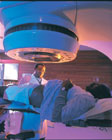  Prostate
Puzzle
Prostate
Puzzle
Srinivasan
Vijayakumar was sitting in a quiet conference room at Michael Reese
Hospital and Medical Center on the South Side of Chicago some 12
years ago, a spreadsheet of prostate cancer data on the table before
him. The spreadsheet laid out vital statistics, including ethnicity
and PSA test results, for the 100 or so men treated for prostate
cancer at the hospital over the previous two years. It seemed to
Vijayakumar, as he scanned the spreadsheet, that PSA levels were
consistently higher in the African-American patients.
Vijayakumar, then a professor of radiation and cellular oncology
at the University of Chicago, was intrigued. The PSA, a blood test
used to detect prostate cancer, was relatively new at the time;
no ethnic variations in the test had ever been reported.
“I ran to the physics room and pulled out a calculator,”
he recalls. The calculator quickly confirmed his suspicion. The
average PSA for the African-American men on the spreadsheet was
two times that of the Caucasian men.
That conference-room observation became the basis of a 1992 article
by Vijayakumar in the journal Cancer Epidemiology Biomarkers &
Prevention; it was the first scientific paper to report on racial
differences in PSA levels among men with prostate cancer. The observation
also sparked Vijayakumar’s career-long interest in understanding
and eliminating ethnic disparities in cancer, a research focus he
carried with him to UC Davis.
One of the nation’s lead- ing radiation oncologists, Vijayakumar
joined UC Davis Cancer Center as professor and chair of the Department
of Radiation Oncology late last year. He also serves as medical
director of the cancer center’s two regional affiliates, Mercy
Cancer Center in Merced and Fremont-Rideout Cancer Center in Marysville.
  

Home |
Table of Contents |
To our Readers |
Building on Basics
Focusing on Patients |
In Translation |
First Steps
Campus Connection |
Benefactors |
News in Brief
UC Davis Health System |
© 2000, 2001, 2002 UC Regents. All rights reserved.
|
 |



 


|



